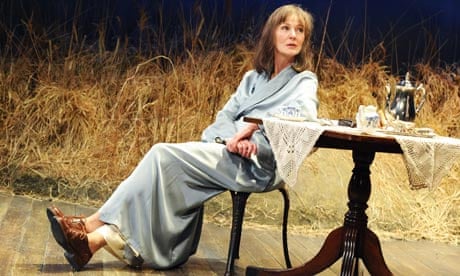Garbo once startled Kenneth Tynan by announcing she had recently visited Bournemouth. Now Frank McGuinness seizes on the star's equally improbable descent on Donegal to write a neo-Chekhovian play about the catalytic impact of a lustrous outsider on a rural Irish household. But, although the result is engaging and intermittently moving, the oddity of the premise is offset by the familiarity of the ingredients.
In McGuinness's version, the Swedish loner arrives in Donegal in 1967 at the invitation of a gay English painter, Matthew Dover, who lives with a cockney boxer. The rambling house Dover occupies was once the property of the Hennessy family who are now reduced to the status of servants; it is on them Garbo makes the biggest impact. Her own resonant solitude finds its echo in the housekeeper, Paulie, to whom the star is attracted. And, even if Garbo doesn't take a shine to Paulie's boozing brother and his fractious wife, she is intrigued by their teenage daughter, Colette, who yearns to study medicine in Dublin.
It is hard not to be captivated by Garbo, who self-mockingly describes herself as "a great gloomy Swede" and whose aloofness conceals a considerable acuity. McGuinness also pins down an Ireland on the cusp of profound change: civil rights marches are beginning in Derry, and Colette's aspirations symbolise a new generation's desire to escape poverty. But McGuinness, who has lately spent much of his time translating other men's plays, seems unable to shake off their influence. Chekhovian echoes are everywhere, from rural picnics to sudden gunshots and arguments about property. When Garbo and Paulie attempt a kitchen tango, we are reminded of Friel's Dancing at Lughnasa, which McGuinness adapted for the screen. Even the humiliating kiss which Dover's lover plants on the lips of Paulie's brother stirs memories of A View from the Bridge.
But, although the play traverses familiar territory, there is a stunning performance from the American actor Caroline Lagerfelt as Garbo. She not only has the right look of attenuated grace: she also captures the nomadic restlessness and amused irony of a woman who sees herself, along with Cardinal Spellman, as one of New York's "most confirmed bachelors". This rivetingly plausible evocation of a screen icon is well supported, in Nicolas Kent's production, by Michelle Fairley as the loveless, life-wasted Paulie, Daniel Gerroll as the quietly acquisitive painter, and Tom McKay as his pugilistic lover. If the play is remembered, however, it will be for McGuinness's strange ability to give earthly form to a star whose surname, in Swedish, means "spirit".
